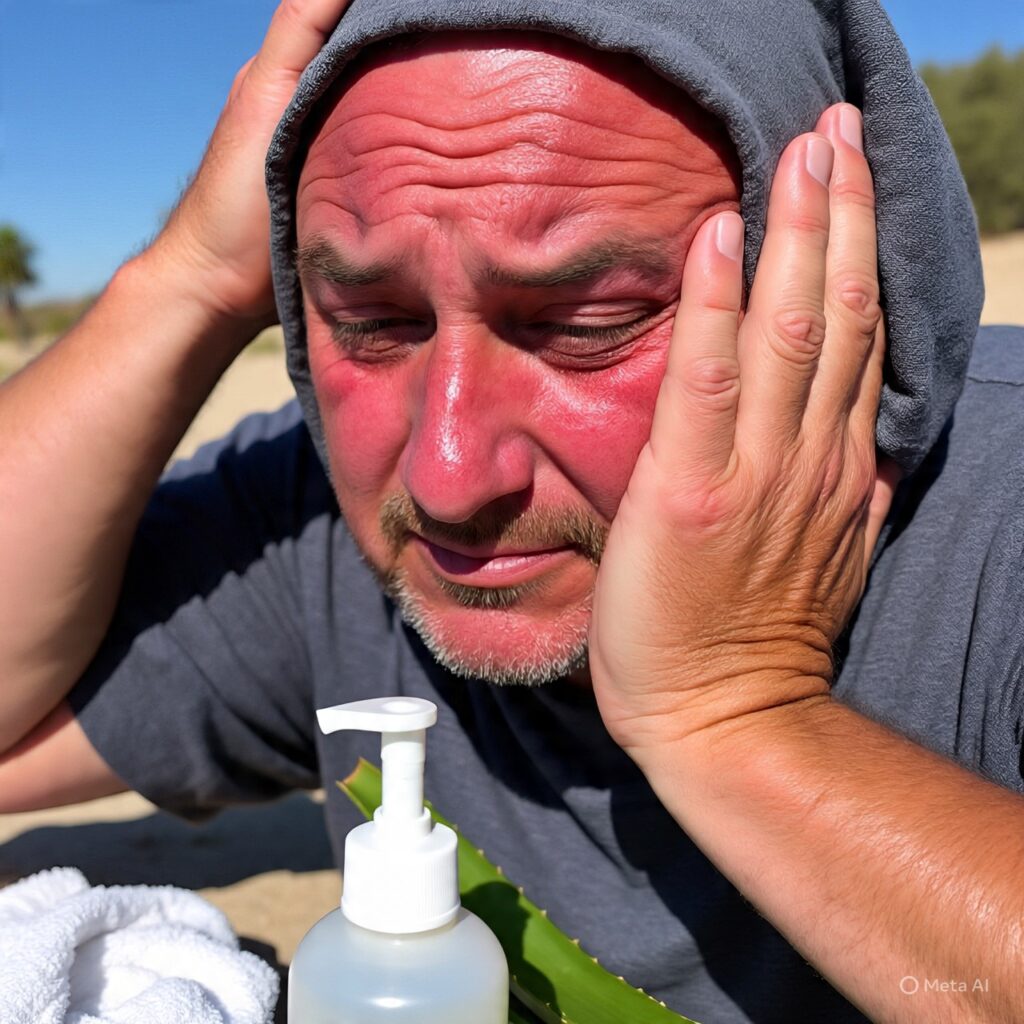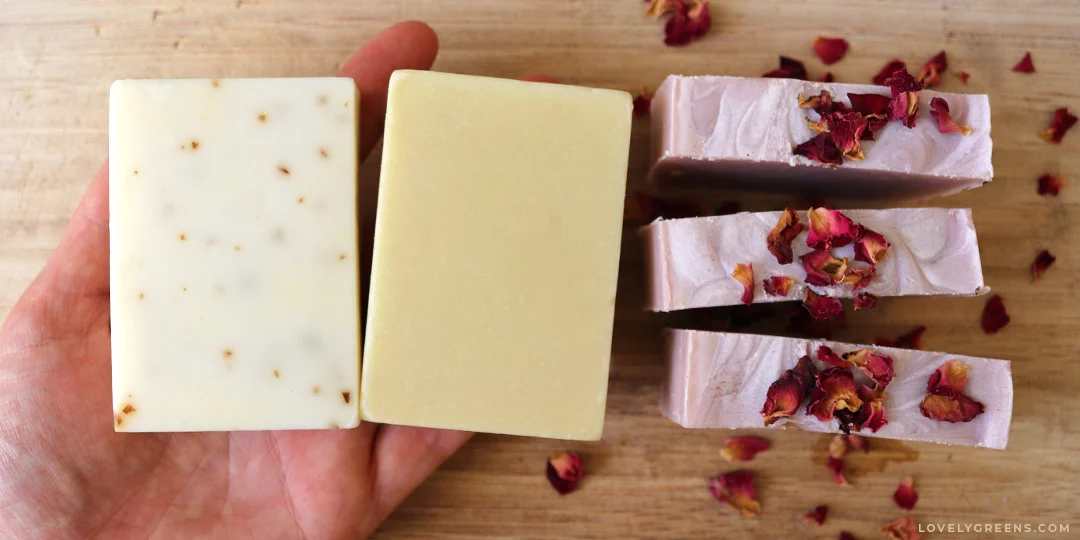I hope this article finds you well, providing guidance on how to get rid of sunburn quickly. Scroll till the end to find out the symptoms, causes, treatment and how you can get relief from sunburn naturally with home remedies.
Sunburn skin can be more than just a temporary annoyance. It’s a sign that our skin has been damaged by the sun’s powerful ultraviolet (UV) rays. Not only can it cause discomfort, but repeated sunburns over time can increase the risk of developing skin cancer.
But don’t worry! There are simple steps you can take to protect yourself and enjoy the sun safely. First and foremost, sunscreen is your best buddy. Make sure to use a broad-spectrum sunscreen with a high SPF, and reapply it every couple of hours, especially if you’re swimming or sweating. Don’t forget those often-neglected areas like your ears, lips, and the back of your neck!
Symptoms Of Sunburn

- Redness and inflammation
- Pain or tenderness
- Swelling
- Blisters
- Peeling skin
- Headache
- Fever
- Nausea
Wishing you sunny (and burn-free) days ahead!
Causes Of Sunburn Skin
Sunburn is primarily caused by prolonged exposure to the sun’s ultraviolet (UV) radiation. When our skin is exposed to excessive UV rays, it triggers a series of reactions that lead to the characteristic redness, pain, and inflammation associated with sunburn.
To treat sunburn skin effectively, it’s crucial to understand its causes. Here are the primary factors that contribute to sunburn skin:
Time of Exposure:
Spending extended periods in direct sunlight without protection increases the risk of sunburn. The longer you stay under the sun, especially during peak hours when the sun’s rays are strongest, the greater the chance of getting sunburned.
Intensity of UV Radiation:
UV radiation is strongest when the sun is at its highest point in the sky, typically between 10 a.m. and 4 p.m. During these hours, the intensity of UV rays is higher, making it easier to get sunburned.
Lack of Protection:
Failing to use appropriate sun protection measures leaves the skin vulnerable to sunburn. This includes not applying sunscreen with a sufficient sun protection factor (SPF), neglecting to wear protective clothing, hats, or sunglasses, and not seeking shade when needed.
Skin Sensitivity:
Some individuals have naturally sensitive skin, making them more prone to sunburn. People with fair skin, light-colored hair, and light-colored eyes generally have less melanin, which provides natural protection against UV radiation.
Medications and Chemicals:
Certain medications and chemicals can increase sensitivity to the sun, making the skin more susceptible to sunburn. Examples include certain antibiotics, acne medications, and perfumes containing photosensitizing ingredients.
How To Get Relief from Sunburn Skin Fast
Take cool showers or baths:
Gently cleanse the sunburned skin with cool (not cold) water. Avoid using harsh soaps or scrubbing the affected area, as this can further irritate the skin.
Moisturize with a soothing lotion:
Apply a gentle, fragrance-free moisturizing lotion to the sunburned skin. Look for products containing ingredients like aloe vera or hyaluronic acid, which can help hydrate and soothe the skin.
Use over-the-counter pain relievers:
Nonsteroidal anti-inflammatory drugs (NSAIDs), such as ibuprofen or aspirin, can help reduce pain, inflammation, and discomfort associated with sunburn. Follow the instructions on the packaging and consult a healthcare professional if needed.
Avoid further sun exposure:
Protect the sunburned skin from additional sun exposure until it has healed. Wear loose-fitting clothing that covers the affected areas or use a broad-brimmed hat for added protection when outdoors.
Stay hydrated:
Drink plenty of water to help keep your body and skin hydrated. Sunburn can dehydrate the body, so replenishing fluids is important for the healing process.
Seek medical advice if necessary:
If your sunburn is severe, covers a large area of your body, or is accompanied by severe symptoms such as blistering, fever, or dizziness, it’s important to consult a healthcare professional for appropriate medical advice and treatment options.
Follow aftercare instructions:
If you receive medical treatment for sunburn, such as prescribed creams or ointments, follow your healthcare provider’s instructions carefully. They may also provide specific recommendations based on the severity of your sunburn.
Topical Steroids:
If your sunburn is severe and causing significant discomfort, your healthcare provider may prescribe a topical steroid cream or ointment. These medications can help reduce inflammation, itching, and redness.
Cool Compresses:
Applying cool, damp compresses to the sunburned skin can help soothe the area and provide temporary relief. Use a clean cloth or towel soaked in cool water and gently apply it to the affected areas for 15-20 minutes at a time.
Hydrocortisone Cream:
Over-the-counter hydrocortisone cream can help relieve itching and inflammation associated with sunburn. Apply a thin layer of the cream to the affected areas as directed on the packaging.
Avoid Harsh Products:
Avoid using harsh soaps, exfoliants, or products containing alcohol on sunburned skin. These can further irritate the skin and delay the healing process. Instead, choose gentle, fragrance-free cleansers and moisturizers.
Protect Blisters:
If blisters develop as a result of severe sunburn, it’s important not to pop or pick at them. Leave the blisters intact and protect them with sterile, non-stick dressings to prevent infection.
Stay Cool:
Keep the environment cool to minimize discomfort and prevent excessive heat from exacerbating the sunburn. Use fans, air conditioning, or cool, moist towels to create a comfortable atmosphere.
Gentle Cleansing:
When washing sunburned skin, use mild, non-irritating cleansers and avoid scrubbing or rubbing the area. Pat the skin dry gently with a soft towel instead of rubbing.
Consider OTC Burn Creams:
Over-the-counter burn creams or gels containing ingredients like lidocaine or benzocaine can provide temporary relief from pain and discomfort associated with sunburn. Follow the instructions on the packaging and use them as directed.
How To Get Sunburn Relief With Natural Ingredients
While there is no magical instant cure for sunburn, there are several home remedies that can help alleviate discomfort and promote the healing process. Here are some home remedies to try:
Home Remedies To Relief Sunburn
Aloe Vera For Sunburn Skin:
Aloe vera is known for its soothing and healing properties. Apply pure aloe vera gel directly from the plant or use a store-bought gel containing a high percentage of aloe vera. Apply it generously to the sunburned skin to moisturize, cool, and reduce inflammation.
Oatmeal Bath For Sunburn Skin:
Taking a cool oatmeal bath can help relieve sunburn discomfort. Grind oatmeal into a fine powder and add it to cool bathwater. Soak in the bath for 15-20 minutes to soothe the skin and reduce itching.
Moisturizers:
Keep the sunburned skin moisturized to prevent dryness and peeling. Choose a gentle, fragrance-free moisturizer or aloe vera-based lotion and apply it generously to the affected areas. Avoid moisturizers with irritants like alcohol or fragrances, as they can further irritate the skin.
Cold Milk Compress For Sunburn Skin:
Dip a clean cloth in cold milk and gently apply it to the sunburned skin. The milk’s proteins can help soothe the skin and provide temporary relief.
Honey For Sunburn Skin:
Honey has natural antibacterial properties and can help soothe sunburned skin. Apply a thin layer of honey to the affected areas and leave it on for 15-20 minutes before rinsing off with cool water.
Cucumber Slices For Sunburn Skin:
Place chilled cucumber slices on the sunburned areas to provide cooling relief. Cucumbers have a high water content and can help hydrate the skin.
Baking Soda Paste For Sunburn Skin:
Mix baking soda with cool water to create a paste, then gently apply it to the sunburned areas. Baking soda can help soothe the skin and reduce inflammation. Rinse off the paste after a few minutes and pat the skin dry.
Vinegar For Sunburn Skin:
Dilute white vinegar with cool water and apply it to the sunburned skin using a soft cloth or spray bottle. Vinegar can help balance the skin’s pH and provide relief from itching and pain. Rinse off the vinegar after a few minutes.
Potato Slices For Sunburn Skin:
Cut chilled potato slices and place them on the sunburned skin. Potatoes have a cooling effect and may help alleviate discomfort.
Black Tea For Sunburn Skin:
Brew black tea and let it cool. Soak a clean cloth in the tea and apply it to the affected areas for 15-20 minutes. The tannins in black tea can provide relief from inflammation and aid in healing.
Witch Hazel For Sunburn Skin:
Apply witch hazel extract to the sunburned skin using a cotton ball or cloth. Witch hazel has a cooling effect and can help reduce inflammation and pain.
Coconut Oil For Sunburn Skin:
Apply organic, cold-pressed coconut oil to the sunburned areas. Coconut oil has moisturizing properties that can help hydrate the skin and reduce peeling.
Chamomile Tea For Sunburn Skin:
Brew chamomile tea, let it cool, and use it as a soothing compress by applying it to the sunburned skin. Chamomile has anti-inflammatory properties and can provide relief.
Cold Water Soak:
Take a cool bath or shower to lower the overall body temperature and provide temporary relief from sunburn.
Remember, everyone’s skin is different, and what works for one person may not work for another. It’s essential to listen to your body and discontinue any remedy that causes further irritation or discomfort. If your sunburn is severe, covers a large area, or is accompanied by severe symptoms, it’s important to seek medical attention.
How To Prevent Sunburn Skin
Preventing sunburn is crucial for maintaining healthy skin and reducing the risk of long-term damage. Here are some effective strategies to prevent sunburn:
Apply Sunscreen:
Use a broad-spectrum sunscreen with a Sun Protection Factor (SPF) of 30 or higher. Apply it generously to all exposed areas of skin at least 15-30 minutes before sun exposure. Reapply every two hours or more frequently if sweating or swimming.
Seek Shade:
Stay in the shade, especially during peak sun hours between 10 a.m. and 4 p.m. If shade is not readily available, create your own shade using umbrellas, hats, or clothing with UPF (Ultraviolet Protection Factor).
Wear Protective Clothing:
Cover your skin with lightweight, loose-fitting clothing that provides adequate coverage. Opt for long-sleeved shirts, long pants, and wide-brimmed hats to shield your face, neck, and ears from the sun.
Wear Sunglasses:
Protect your eyes and the delicate skin around them by wearing sunglasses with UV protection. Look for sunglasses labeled with 100% UVA and UVB protection.
Limit UV Reflection:
Remember that sand, water, snow, and concrete can reflect UV rays, increasing the risk of sunburn. Take extra precautions in these environments by applying sunscreen more frequently and wearing appropriate protective clothing.
Stay Hydrated:
Drink plenty of water throughout the day to keep your body and skin hydrated. Proper hydration supports skin health and can potentially minimize the effects of sun exposure.
Be Sun Smart:
Be mindful of your sun exposure and take breaks from direct sunlight. If you’re engaging in outdoor activities, plan them earlier or later in the day when the sun is less intense.
Check Medication Labels:
Some medications can increase sensitivity to the sun, making you more prone to sunburn. Read medication labels and consult your healthcare provider if you’re unsure about any potential side effects.
Protect Lips and Ears:
Don’t forget to apply sunscreen to your lips using a lip balm with SPF, and protect your ears by wearing a wide-brimmed hat or using sunscreen on the exposed areas.
Educate Others About Sunburn skin:
Spread awareness about sunburn prevention to your friends, family, and community. Encourage sun safety practices and remind others of the importance of protecting their skin from harmful UV rays.
Remember, sunburn can occur even on cloudy days, and it’s important to practice sun protection year-round. By incorporating these preventive measures into your routine, you can enjoy the outdoors while keeping your skin healthy and safe.
FAQs About Sunburn Skin
1. Does Vaseline help sunburn skin?
While Vaseline (petroleum jelly) can help moisturize the skin, it is not specifically designed or recommended for treating sunburn. However, in some cases, it may provide temporary relief by locking in moisture and creating a protective barrier over the sunburned skin.
Here are some points to consider regarding the use of Vaseline for sunburn:
- Moisturization
- Protective Barrier
- Cooling Effect
If you choose to use Vaseline for sunburn, keep the following in mind:
- Apply a thin layer of Vaseline to clean, dry skin.
- Avoid applying Vaseline to open blisters or broken skin.
- Use Vaseline as a moisturizer rather than as the primary treatment for sunburn.
- If you experience any adverse reactions or increased discomfort, discontinue use and consult a healthcare professional.
2. What is the best sunburn treatment?
- Cool Compresses or Cool Baths:
- Moisturizers with Aloe Vera
- Stay Hydrated
- Avoid Further Sun Exposure
3. Is Vitamin C good for sunburn skin?
Vitamin C can offer some benefits for sunburned skin due to its antioxidant and anti-inflammatory properties.
Here’s how Vitamin C can be beneficial for sunburned skin:
Antioxidant Protection:
Sunburn causes oxidative stress in the skin due to the production of free radicals. Vitamin C is a powerful antioxidant that helps neutralize these free radicals, reducing the damage they can cause to the skin cells.
Collagen Production:
Vitamin C plays a crucial role in the synthesis of collagen, a protein that provides structure and support to the skin. Sunburn can damage collagen fibers, leading to compromised skin integrity. By promoting collagen production, Vitamin C can aid in the healing and repair of sun-damaged skin.
Anti-inflammatory Effects:
Sunburn causes inflammation in the skin, leading to redness, swelling, and discomfort. Vitamin C possesses anti-inflammatory properties that can help reduce inflammation and soothe the sunburned skin.
To incorporate Vitamin C into your sunburn care routine, you can consider the following:
Topical Vitamin C Serums:
Look for topical serums or creams containing Vitamin C and apply them to the sunburned areas. These products can help provide antioxidant protection and support skin healing. Ensure the product is specifically formulated for topical use.
Dietary Sources:
Consume foods rich in Vitamin C to support overall skin health and healing. Include citrus fruits, strawberries, kiwis, leafy greens, bell peppers, and other Vitamin C-rich foods in your diet.
4. Does vitamin D stop sunburn skin?
No, vitamin D does not stop sunburn. Vitamin D is produced in the skin when it is exposed to sunlight, but it does not provide protection against sunburn. Sunburn occurs when the skin is damaged by excessive ultraviolet (UV) radiation from the sun. To prevent sunburn, it is important to take measures such as using sunscreen, seeking shade, and wearing protective clothing.




